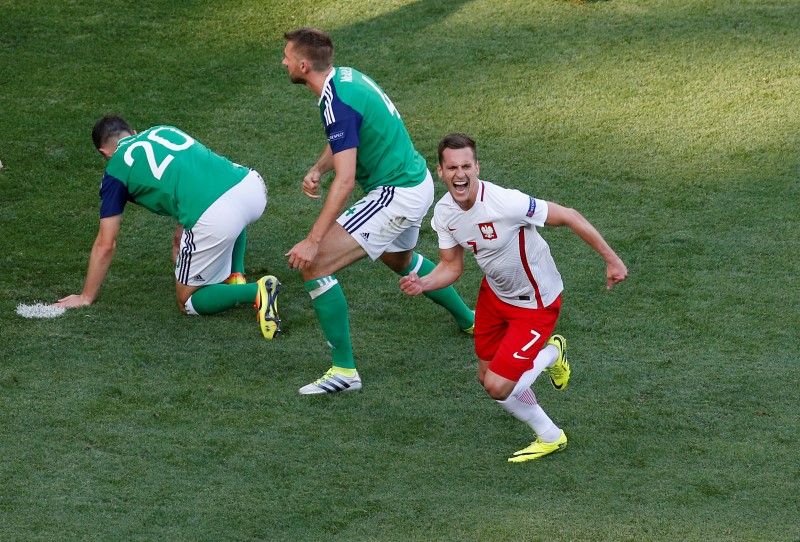By Steve Tongue
NICE, France (Reuters) - Not every underdog has its day. Exactly 30 years after losing 3-0 to Brazil in their last match at a major tournament, the 1986 World Cup, Northern Ireland again found more gifted opponents too strong for them.
The plan concocted by boss Michael O'Neill, one of the less personality conscious of modern football managers, was evident from the time his team-sheet was handed in with three centre backs on it.
That trio of Premier League players -- West Bromwich Albion pair Jonny Evans and Gareth McAuley, plus Watford's Craig Cathcart -- had a minor success in keeping Robert Lewandowski subdued.
But despite reaching halftime without having conceded a goal in more than five hours of football, it was only ever going to take one lapse of concentration to undo all the pressing and chasing.
Evans, three times an English champion with Manchester United, suffered it, along with Shane Ferguson, a wing back caught out of position, and the only goal resulted.
Even before then, at the interval, O'Neill, suspecting perhaps that his braves could not withstand another 45 minutes of pressure, began encouraging a less negative approach by introducing Stuart Dallas.
After the goal, he made two further attacking substitutions, to the undoubted delight of striker Kyle Lafferty, who had cut a frustrated figure until that point.
In the first few minutes the robust Lafferty had been waving his arms about, encouraging team mates further forward, but it summed up how hard pressed they were when he headed on one of the long balls knocked in his direction and had to chase it himself.
As ever, a 1-0 deficit was retrievable with a piece of good fortune or a piece of inspiration, but the opportunity never quite materialised.
Unlike the other British underdogs, Wales, Northern Ireland were unable to make the most of their similar system by pushing their full backs forward. They also lack a world-class player of Gareth Bale's stature.
It makes their achievement in winning their qualifying group all the more laudable, but the limitations evident in this performance illustrated the size of the task in securing even third position in a group also containing Germany and Ukraine.

For Poland, the worry would be having made such hard work of what should have been a simpler task. The positive, apart from the obvious one of three points, was confirmation of the promise shown by 19-year-old Bartosz Kapustka, who could emerge as one of the brightest young prospects of Euro 2016 if given the game time.